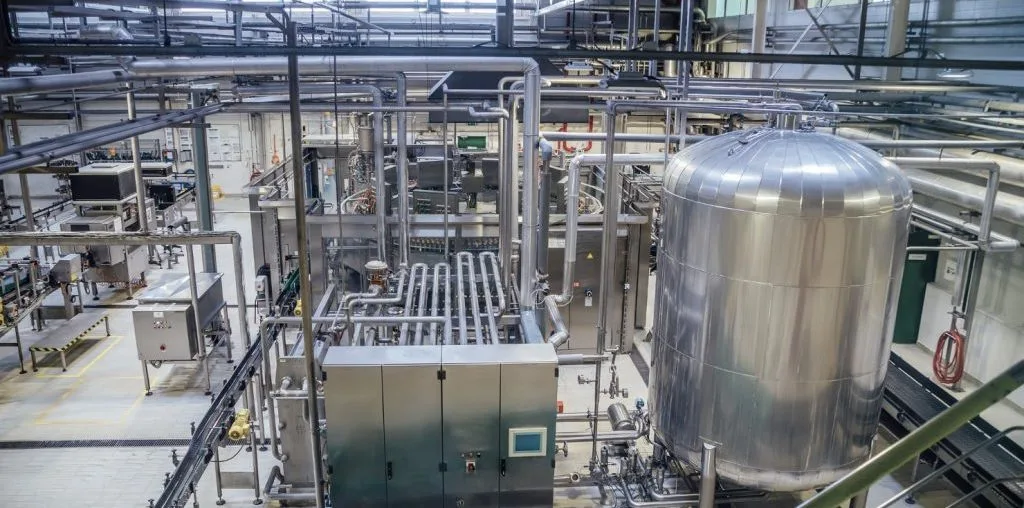Process industries play a crucial role in crafting the products we use regularly, spanning various sectors like pharmaceuticals, food and beverage, chemicals, and more. These industries employ intricate processes to transform raw materials into the final goods we rely on. As we create this article, we decide to demystify the definition, share examples, and underscore the importance of process industries in shaping our interconnected and dynamic world.
What Is The Process Industry?
The process industry refers to a sector of manufacturing that involves the production of goods through a series of steps or processes. Unlike discrete manufacturing, where individual items are produced separately, process manufacturing involves the continuous or batch production of goods such as chemicals, food, pharmaceuticals, and fuels.
In this industry, raw materials undergo various chemical or mechanical transformations to create the final product. The emphasis is on controlled and systematic processes, often involving precise measurements and specific conditions. Process industries play a pivotal role in providing essential products that cater to various aspects of our daily lives and contribute significantly to the global economy.
What Are Some Examples of The Process Industries?
From pharmaceuticals and chemicals to food processing and semiconductor fabrication, these industries utilize complex processes to meet the demands of various sectors. Below are some of the examples of the process industries:
1. Bulk-drug Pharmaceuticals
The bulk-drug pharmaceutical industry involves the production of pharmaceutical drugs on a large scale, from raw materials to the final medicinal products. It encompasses the manufacturing of active pharmaceutical ingredients (APIs) and other essential components.
2. Chemical, Tire, and Process Industries (CTP)
CTP industries involve the production of a wide range of chemicals, tires, and other processed materials. Chemical manufacturing includes the synthesis of various chemical compounds, while tire manufacturing focuses on the production of rubber-based products. The process industries within CTP contribute to diverse manufacturing sectors.
3. Cosmeceuticals and Personal Care
Cosmeceuticals and personal care industries focus on the production of cosmetic and personal care products that combine cosmetic and pharmaceutical characteristics. This includes skincare, haircare, and hygiene products designed to enhance and maintain personal well-being.
4. Food and Beverage, Food Processing
The food and beverage industry encompasses the processing and manufacturing of food products. Food processing involves transforming raw agricultural materials into consumable goods, ensuring their safety, and enhancing their shelf life.
5. Nutraceuticals
Nutraceuticals involve the production of nutritional supplements and functional foods that provide health benefits beyond basic nutrition. This industry focuses on developing products that contribute to overall well-being and health maintenance.
6. Paints and Coatings
The paints and coatings industry involves the manufacturing of paints, varnishes, and protective coatings. These products are used for decorative, protective, and functional purposes in construction, automotive, and industrial applications.
7. Semiconductor Fabrication
Semiconductor fabrication is a critical process industry responsible for the production of semiconductor devices like integrated circuits. This industry plays a vital role in electronics, contributing to the manufacturing of electronic components and devices.
8. Specialty Chemicals
Specialty chemicals encompass a diverse range of chemical products with unique characteristics and applications. These chemicals are often produced for specific industrial or commercial purposes, addressing specialized needs.
9. Steel and Aluminium Processing
Steel and aluminum processing industries involve the production of these metals through various manufacturing processes. This includes refining raw materials, shaping metal products, and ensuring quality for applications in construction, transportation, and other sectors.
10. Textiles
The textile industry involves the processing of fibers into fabrics and textiles. This encompasses activities such as spinning, weaving, and dyeing to create a wide range of textile products, including clothing, carpets, and industrial fabrics.
What Are The Relevant Factors in The Process Industries?
In the world of process industries, critical considerations include formulation, ensuring the right mix of ingredients, and packaging, and determining how the final product takes its shape for delivery.
1. Formulation
In the process industries, formulation is a critical factor that involves creating the desired composition of a product. It encompasses determining the precise combination of raw materials, chemicals, or components necessary to achieve the intended properties, quality, and functionality of the final product.
According to Wikipedia, the ingredient proportions are crucial, and scalability is another important factor. Scalability means the ability to adjust the formula to make different quantities of a product. For example, if a formula is designed to produce 500 liters of a chemical, it should be scalable to make 250 liters or 1,000 liters as needed. Scalability also allows adjusting production based on ingredient availability.
This step requires a deep understanding of chemical interactions, material characteristics, and the desired end-use of the product. Formulation considerations vary across industries, from pharmaceuticals ensuring the efficacy and safety of drugs to food and beverages achieving taste and nutritional profiles.
2. Packaging
A packaging recipe is akin to a formula but focuses on how the final product is assembled rather than the ingredient proportions. It outlines details like containers, labels, cartons, and shrink-wrapping. In process manufacturing, products are often made in bulk but are not delivered to customers in bulk form.
Packaging is a crucial factor in the process industries that involves the design, selection, and implementation of containers or materials to enclose and protect the final product. Beyond its protective role, packaging also influences product presentation, transportation, storage, and shelf life.
In pharmaceuticals, for example, packaging must adhere to stringent regulations to maintain product integrity, while in the food industry, packaging choices impact freshness, safety, and consumer appeal. Overall, effective formulation and thoughtful packaging are essential components in ensuring the success and quality of products within the process industries.
In summary, process industries play a vital role in shaping our modern world by efficiently producing a diverse range of essential goods. From pharmaceuticals and chemicals to food and beverages, these industries ensure the formulation and packaging of products that meet our daily needs.
The precision in managing ingredients and the thoughtful packaging processes contribute not only to the availability of products but also to their accessibility in various forms. The dynamic nature of process industries remains at the core of supplying diverse and necessary items, influencing and supporting our daily lives in numerous ways.






